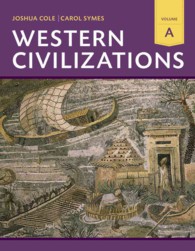- ホーム
- > 洋書
- > 英文書
- > Philosophy
基本説明
A comprehensive introduction to the theory of knowledge.
Full Description
A comprehensive introduction to the theory of knowledge.
Guided by the founding ideas of American pragmatism, Epistemology provides a clear example of the basic concepts involved in knowledge acquisition and explains the principles at work in the development of rational inquiry. It examines how these principles analyze the course of scientific progress and how the development of scientific inquiry inevitably encounters certain natural disasters. At the center of the book's deliberations there lies not only the potential for scientific progress but also the limit of science as well. This comprehensive introduction to the theory of knowledge addresses a myriad of topics, including the critique of skepticism, the nature of rationality, the possibility of science for extraterrestrial intelligences, and the prospect of insoluble issues in science.
Contents
Preface
Introduction
KNOWLEDGE AND ITS PROBLEMS
1. Modes of Knowledge
Is Knowledge True Justified Belief?
Modes of (Propositional) Knowledge
Other Basic Principles
2. Fallibilism and Truth Estimation
Problems of Metaknowledge
The Preface Paradox
The Diallelus
An Apory and Its Reconciliation: K-Destabilization
Costs and Benefits
More on Fallibilism
The Comparative Fragility of Science: Scientific Claims as Mere Estimates
Fallibilism and the Distinction Between Our (Putative) Truth and the Real Truth
3. Skepticism and Its Deficits
The Skeptic's "No Certainty" Argument
The Role of Certainty
The Certainty of Logic Versus the Certainty of Life
Pragmatic Inconsistency
Skepticism and Risk
Rationality and Cognitive Risk
The Economic Dimension: Costs and Benefits
The Deficiency of Skepticism
4. Epistemic Justification in a Functionalistic and Naturalistic Perspective
Experience and Fact
Problems of Common-Cause Epistemology
Modes of Justification
The Evolutionary Aspect of Sensory Epistemology
Rational versus Natural Selection
Against "Pure" Intellectualism
The Problem of Error
Conclusion
5. Plausibility and Presumption
The Need for Presumptions
The Role of Presumption
Plausibility and Presumption
Presumption and Probability
Presumption and Skepticism
How Presumption Works: What Justifies Presumptions
6. Trust and Cooperation in Pragmatic Perspective
The Cost Effectiveness of Sharing and Cooperating in Information Acquisition and Management
The Advantages of Cooperation
Building Up Trust: An Economic Approach
Trust and Presumption
A Community of Inquirers
RATIONAL INQUIRY AND THE QUEST FOR TRUTH
7. Foundationalism and Coherentism
Hierarchical Systemization: The Euclidean Model of Knowledge
Cyclic Systemization: The Network Model—An Alternative to the Euclidean Model
The Contrast Between Foundationalism and Coherentism
Problems of Foundationalism
8. The Pursuit of Truth: Coherentist Criteriology
The Coherentist Approach to Inquiry
The Central Role of Data for a Coherentist Truth-Criteriology
On Validating the Coherence Approach
Ideal Coherence
Truth as an Idealization
9. Cognitive Relativism and Contextualism
Cognitive Realism
What's Wrong with Relativism
The Circumstantial Contextualism of Reason
A Foothold of One's Own: The Primacy of Our Own Position
The Arbitrament of Experience
Against Relativism
Contextualistic Pluralism is Compatible with Commitment on Pursuing "The Truth"
The Achilles' Heel of Relativism
10. The Pragmatic Rationale of Cognitive Objectivity
Objectivity and the Circumstantial University of Reason
The Basis of Objectivity
The Problem of Validating Objectivity
What is Right with Objectivism
Abandoning Objectivity is Pragmatically Self-Defeating
11. Rationality
Stage-Setting for the Problem
Optimum-Instability
Ideal versus Practical Rationality: The Predicament of Reason
The Problem of Validating Rationality
The Pragmatic Turn: Even Cognitive Rationality has a Pragmatic Rationale
Alternative Modes of Rationality?
The Self-Reliance of Rationality is Not Viciously Circular
COGNITIVE PROGRESS
12. Scientific Progress
The Exploration Model of Scientific Inquiry
The Demand for Enhancement
Technological Escalation: An Arms Race Against Nature
Theorizing as Inductive Projection
Later Need Not Be Lesser
Cognitive Copernicanism
The Problem of Progress
13. The Law of Logarithmic Returns and the Complexification of Natural Science
The Principle of Least Effort and the Methodological Status of Simplicity-Preference in Science
Complexification
The Expansion of Science
The Law of Logarithmic Returns
The Rationale and Implications of the Law of Logarithmic Returns
The Growth of Knowledge
The Deceleration of Scientific Progress
Predictive Implications of the Information/Knowledge Relationship
The Centrality of Quality and its Implications
14. The Imperfectability of Knowledge: Knowledge as Boundless
Conditions of Perfected Science
Theoretical Adequacy: Issues of Erotetic Completeness
Pragmatic Completeness
Predictive Completeness
Temporal Finality
"Perfected Science" As an Idealization that Affords a Useful Contrast Conception
The Dispensability of Perfection
COGNITIVE LIMITS AND THE QUEST FOR TRUTH
15. The Rational Intelligibility of Nature
Explaining the Possibility of Natural Science
"Our" Side
Nature's Side
Synthesis
Implications
16. Human Science as Characteristically Human
The Potential Diversity of "Science"
The One World, One Science Argument
A Quantitative Perspective
Comparability and Judgments of Relative Advancement or Backwardness
Basic Principles
17. On Ignorance, Insolubilia, and the Limits of Knowledge
Concrete versus Generic Knowledge and Ignorance
Erotetic Incapacity
Divine versus Mundane Knowledge
Issues of Temporalized Knowledge
Kant's Principle of Question Exfoliation
Cognitive Incapacity
Insolubilia Then and Now
Cognitive Incapacity
Identifying Insolubilia
Relating Knowledge to Ignorance
Postscript: A Cognitively Indeterminate Universe
18. Cognitive Realism
Existence
Is Man the Measure?
Realism and Incapacity
The Cognitive Opacity of Real Things
The Cognitive Inexhaustibility of Things
The Corrigibility of Conceptions
The Cognitive Inexhaustibility of Things
Cognitive Dynamics
Conceptual Basis of Realism as a Postulate
Hidden Depths: The Impetus to Realism
The Pragmatic Foundation of Realism as a Basis for Communication and Discourse
The Idealistic Aspect of Metaphysical Realism
Science and Reality
Notes
Index








